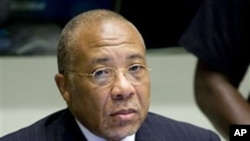Judges at the war crimes trial of former Liberian President Charles Taylor have admitted into evidence two Wikileaks documents that appear to question the impartiality of the Special Court for Sierra Leone. The decision comes just days before prosecutors and defense attorneys present their closing arguments in Mr. Taylor's war crimes trial.
Mr. Taylor is pleading not guilty to 11 counts of crimes against humanity for his alleged support of Revolutionary United Front rebels during a 10-year civil war in neighboring Sierra Leone.
His trial is drawing to a close after more than three years of testimony.
The secret U.S. cables released by Wikileaks are nearly two years old and appear to reveal doubts over the impartiality of the Special Court for Sierra Leone. An April 2009 document shows concern that Justice Julia Sebutinde has a timing agenda. Sebutinde is the only African judge presiding.
The document suggests she may have deliberately slowed court proceedings to ensure that she heads the Trial Chamber when they deliver Taylor’s final sentence.
"We are closely following the trial," said attorney Larry Thomas, who works in Liberia’s capital, Monrovia. "I think it is going well with witnesses taking the stand. But the Wikileaks information has the propensity to start a process, but we are watching the process with eagle eyes."
Other Wikileaks cables suggest the United States had concern about pro-Taylor groups organizing themselves in the rural parts of Liberia. The same cable said the U.S. government’s best option was to ensure that Mr. Taylor is jailed for a long time, even if it meant bringing the case over to the United States where he could be tried for financial crimes or with new laws against the use of child soldiers.
University of Liberia political science student Maxell Siemon says the cables damage the court's credibility.
"It means that the trial is politically motivated and the true essence of it will not be realized," Siemon said. "So in this manner, I am disappointed in the trial and I think it is like a witch-hunt for Mr. Taylor, because if he was judged from what the U.S. ambassador said regarding Taylor coming back to this region, it will mean that the region will be destabilized."
Aaron Coleman is a small trader in Monrovia. He has been following Taylor’s trial closely.
"All we prefer is a fair trial where his lawyers will feel comfortable, Liberians, Africans, the international community also will feel comfortable," he said. "What I believe, that should serve as a deterrent, that should serve as a warning to other Liberians, to other citizens, to other people from Africans, not only Africa, but the world at large."
Mr. Taylor's trial is being held at space rented from the International Criminal Court in The Hague, because of fears that a trial in Sierra Leone could spark regional unrest.
The prosecution and defense are expected to deliver their closing arguments on February 8. If convicted, Mr. Taylor will serve prison time in Britain. The U.N.-backed tribunal does not impose the death penalty.
Court Admits Wikileaks Documents in Former Liberian President's Trial








